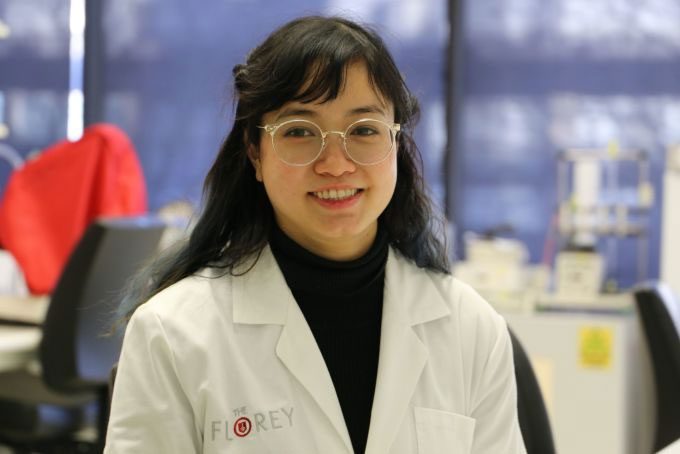In the field of neurology, a syndrome known as ALS causes paralysis and death, with no current cure available. Trần Lê Bảo Châu and her team at the University of Melbourne are researching new technologies to identify the underlying causes of this disease.
ALS Syndrome is a rare disease characterized by the progressive death of motor neurons that control muscles in the body, leading to muscle atrophy and paralysis. Patients are unable to control their limb movements and typically die from respiratory failure within 2 to 5 years after diagnosis. Currently, there is no effective treatment for the disease; Riluzole is used to extend life by only 2-3 months.
“Current methods have not helped scientists identify the direct cause of ALS, which is why our team is pursuing a research design in animals that can replicate the pathological development process to understand the underlying factors contributing to disease progression,” Bảo Châu told VnExpress.
Trần Lê Bảo Châu, 27, and her collaborators at the Florey Institute of Neuroscience and Mental Health, part of the University of Melbourne, are cultivating stem cells from ALS patients and transplanting them into mouse brains. This approach aims to mitigate the limitations of traditional cell culture in laboratories and facilitates animal research. Currently, the experiment is successful; after more than 9 months of receiving human neuronal cells, the mice remain healthy.
Bảo Châu indicated that if the disease development process can be successfully replicated, scientists may utilize this research to understand the causes of the disease better, thereby aiding accurate diagnosis and exploring ways to slow its progression. Additionally, animal models could be used for drug testing prior to clinical trials.
Bảo Châu’s research employs advanced new techniques such as stem cell culture, immunohistochemistry, laser scanning confocal microscopy for neuroimaging, and 3D reconstruction of neural structures. These are cutting-edge techniques in the field.

Second-year research student, Trần Lê Bảo Châu. (Photo: NVCC)
In November 2023, Trần Lê Bảo Châu was the only Vietnamese female student among six individuals recognized at the Graeme Clark Institute (GCI) STEM Student Award. This award, organized by the Graeme Clark Institute at the University of Melbourne, honors and acknowledges female researchers at the University of Melbourne who have significant projects in the biomedical engineering field and notable contributions to the STEM research community.
Bảo Châu received the full Nancy Frances Curry PhD scholarship, designated for students researching ALS (Amyotrophic Lateral Sclerosis). She is currently in her third year of PhD research at the Florey Institute of Neuroscience and Mental Health and serves as a scientific advisor at the Gene Technology Access Centre (GTAC).
Bảo Châu was born in Ho Chi Minh City. She describes her choice to pursue neurology as a serendipitous event, something she never thought she would do, especially since she was once quite fearful of anything related to the brain or eyes, often portrayed in horror films.
At 18, Châu moved to Australia to study Science at Monash University. After two years, she switched her focus to Pharmaceutical Chemistry, hoping to work in the cosmetics pharmaceutical industry upon graduation. However, during her time volunteering at the Florey Institute, she was inspired once again to pursue science and later found herself researching neurodegenerative diseases at the University of Melbourne. “Science has an indescribable allure for me, and it’s never too late to learn anything,” she remarked.
Dr. Val Rytova from the University of Melbourne praised Châu’s exceptional ability to learn new skills. Within just a few months, Châu demonstrated independence in the laboratory and began developing new technical analyses under the microscope. “I believe Châu’s pursuit of a PhD is a significant contribution to neuroscience research, particularly in the urgent field of ALS research,” she shared in her recommendation letter.
From the student support office, Ms. Jacquie Munro-Smith noted, “Châu’s research on ALS is an expanding field that is receiving considerable attention within the scientific community and beyond.“


















































